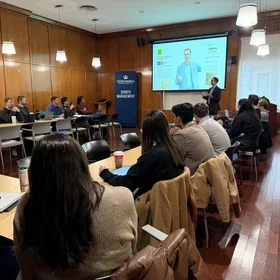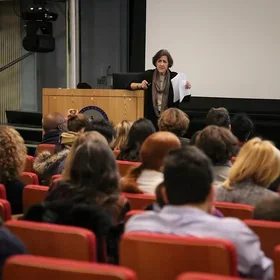Todd Cassler, a partner and chief growth officer at Cerity Partners, is a seasoned leader in the wealth management industry. His journey into the field began somewhat unexpectedly after college, when a chance interview with insurance company American Skandia led him to discover a fulfilling career in financial services. Eager to deepen his knowledge, Cassler sought further education through the Columbia University School of Professional Studies (SPS) Master of Professional Studies in Wealth Management program, where he was invigorated by the diverse backgrounds and enthusiasm of his peers.
In a recent interview with SPS, Todd shares insights into the value of targeted education, the unique challenges of balancing a demanding career with ongoing studies, and his vision for future growth in the ever-evolving financial landscape.
Please describe your current or most recent professional role.
I am a partner and the chief growth officer at Cerity Partners. In my role, I lead the firm's growth strategy, sales, strategic relationship management, and distribution.
What inspired you to pursue a career in wealth management?
After college, I was being recruited by two companies, and my college counselor suggested I practice my interview skills. They recommended I speak with an insurance company called American Skandia. I wasn’t interested in insurance at all—visions of Willy Loman from Death of a Salesman came to mind, with door-to-door sales. But I reluctantly went to the interview, and they offered me a job. At the same time, I received a job offer from one of the other companies, but they wanted me to sign away all my ideas, which would then legally become their property. My parents encouraged me to try the financial services role, saying, “What’s the worst that can happen? You’ll do it for a year, learn about investment products, and move on.” The rest, as they say, is history.
With an established career already, what prompted you to seek further education via Columbia's Wealth Management program?
While I have extensive experience in leadership, financial services, distribution, and growth strategy, personal development is critical to staying ahead of industry changes, especially in a field as dynamic as wealth management. Columbia's program offers a specialized focus on wealth management, allowing me to learn from best-in-class faculty and peers.
Having already received your MBA, how would you describe the difference between an MBA program and a Master’s in Wealth Management program?
My MBA provided a broad understanding of business operations, leadership, and strategic management, which has been foundational in shaping my career. However, Columbia’s Master’s in Wealth Management program is more specialized, focusing on the intricacies of financial planning, estate management, industry trends, and investment management. The MBA gave me a high-level view of how businesses function. At the same time, the Wealth Management program dives deeper into the specific needs of high-net-worth clients, helping professionals like myself provide more tailored, informed advice.
What specifically attracted you to Columbia's Master’s in Wealth Management program?
Columbia's program stood out because of its strong reputation, industry connections, and rigorous curriculum that balances theoretical knowledge with practical application. The faculty's expertise, many practitioners themselves, provides real-world insights I can immediately apply to my work. The program's focus on technical and relational aspects of wealth management aligns with the requirements of providing holistic, client-centric advice in a competitive marketplace.
How do you balance continuing education with a career that's already well established?
Balancing education, a family, and a demanding career requires a disciplined approach. The ability to prioritize time management, ensuring that your work responsibilities are met while carving out time for the program, are key. It's about developing a practice pattern, integrating the work into your daily life and being efficient about how you are allocating your time. It requires that you make choices and say no to things that you may want to do. I also lean on my family, who are incredibly supportive, allowing me the flexibility to pursue this program while maintaining my responsibilities.
Who has been a significant mentor in your career, and how did their guidance influence your path and growth?
I’ve been fortunate to have many great mentors, but two have had the most profound impact early on my career. The first is Matt Gilhuly, my first sales manager at American Skandia. He believed in my ability to sell and trusted me to grow the business, which gave me the confidence to succeed. The second is Ed Oberholtzer, who taught me the importance of context in business and how to truly engage with people. He always put my interests ahead of his own, even recommending me for a position at Neuberger Berman, which became a pivotal moment and catalyst for my career growth.
Throughout your career and educational pursuits, what has been the most valuable lesson you’ve learned that you wish you could share with others in the industry?
Your career can be broken down into three key areas: personal development, corporate development, and compensation. The one area you have full control over is personal development. The more you invest in building your skills and knowledge, the more success you’ll see in the other two areas. Ultimately, your growth in personal development drives both your advancement within the company and your compensation.
What advice would you give to others considering returning to school for further specialization in their field?
I encourage anyone considering further education to consider how it aligns with their long-term goals. Specialization can set you apart in your field, but choosing a program that offers academic rigor and practical application is essential. Also, don't underestimate the importance of networking—connecting with fellow professionals and faculty can be just as valuable as the curriculum. Lastly, be prepared to invest the time and effort, but know that the payoff regarding career advancement and personal growth is well worth it.
About the Program
A 16-month online program with asynchronous instruction, specially designed to accommodate working professionals, Columbia University’s Master of Professional Studies in Wealth Management program is taught by distinguished faculty with deep applied experience in their respective fields. Additionally, it is a CFP Board Registered Program designed to help students meet the educational requirements for CFP® certification.
The fall 2025 application priority deadline for the M.P.S. in Wealth Management program is February 15. The final deadline is June 1. Learn more here.


